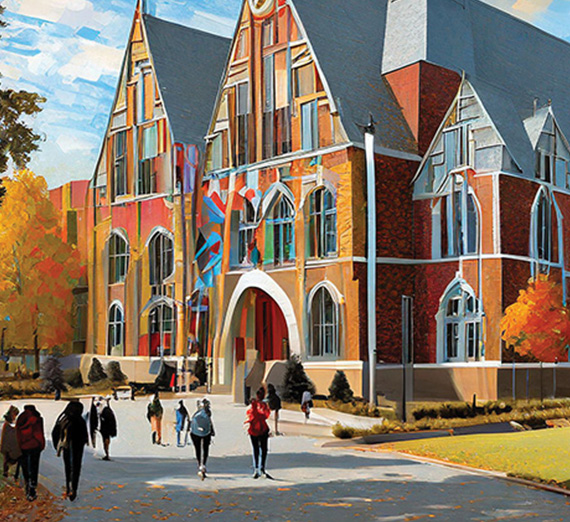AI Around Campus

“The implications of AI technologies for higher education are vast,” wrote Jacob Rooksby, dean of the School of Law, for the Spokane Journal of Business in March 2023, shortly after artificial intelligence app ChatGPT began making waves. While many have raised legitimate concerns about AI’s potential impact on education, Rooksby rings an optimistic note on how it can be harnessed for good.
“Artificial intelligence systems are designed to perform specific tasks efficiently and accurately, but they lack the creativity, empathy, emotional intelligence and ethical reasoning that are essential to a well-functioning society,” he writes.
Here are some ways that’s happening at GU.
English & Writing
Chase Bollig, associate professor of English and director of composition, was quick to brainstorm how to make AI work in composition-writing classes. Students served as both research participants and researchers, making their processes an object of study, and doing reflective writing about their experiences working with AI.
“It completely changed my experience of teaching first-year writing,” Bollig says. Because students were active researchers, “they and I were a little bit closer on equal footing. I still had all the scaffolding, but we were able to discover things together and that was fantastic.”
Philosophy
Charles Lassiter, associate professor of philosophy, has students submit a prompt to AI, allowing it to produce an essay. Students then must revise and critique the given essay. This gives them practice in evaluating written work and allows them to see how often AI makes mistakes. He also utilizes ChatGPT to expand classroom discussions.
“Students can type prompts into ChatGPT and treat it as another member of the discussion group,” Lassiter says. “Topics that are not understood can be asked to ChatGPT to be explained better.”
Mathematics
Eric Hogle, associate professor of mathematics, uses AI to teach the importance of evaluating sources.
“I recently gave students an assignment in my proofs-writing course to evaluate a proof generated by GPT,” Hogle says. “The AI was good at imitating form, so the proof was written with an authoritative, confident style. However, the proof was factually incorrect.”
Hogle aims to hone his students’ evaluative skills, something he argues is “difficult when students are in a hurry and just gobble up text as quickly as they can.”
Admissions
It might seem counterintuitive to use artificial intelligence to forge greater human connection. But Gonzaga’s admission staff says AI can increase their personal interactions with potential students that are so important when they are deciding where to pursue higher education.
“As you can imagine, the number of documents that are evaluated, processed and created during the college matriculation process can be overwhelming,” says Stephen Keller, GU’s senior director of undergraduate admission. “We’re always watching for new technologies that will allow us to be faster with processes so we can better assist more people.”
After all, Keller says, “One of Gonzaga’s greatest strengths is relationships and how we strive to be people who stand for and with others.”
